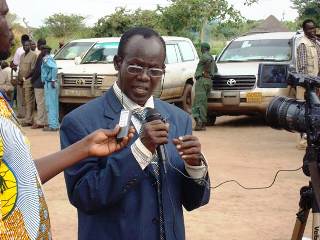New S. Sudan vice-president uncovers strategy to foster unity in diversity
September 4, 2013 (WAU) – South Sudan’s new vice-president, James Wani Igga, has identified a strategy to promote unity in diversity, as well as enhance peaceful coexistence and consolidate efforts to rebuild the new nation ravaged by decades of conflict.

“For us to unite South Sudanese, we must respect the rule of law. Nobody should be jailed and released because he is above the law. We must appear as equal citizens before the law”, said Igga in an address broadcast by the state-owned South Sudan Television (SSTV) on Tuesday.
“Nobody should be released for killing somebody because he is above the law. This is wrong,” he added.
The former speaker of the national legislative assembly stressed that the educational system must be revised to encourage pupils and students from different tribes to study and mix together, adding that intermarriage could also improve relationships between communities.
“We must revise the system of marriage. Makaraka should marry from the Lotuko, Lotuko should marry from [the] Kakwa and Kakwa should marry from [the] Shilluk. Why not? This will unite us honestly. If we don’t appreciate this, we will fall and end up seeing ourselves as tribes, instead of taking our national identity”, said Igga.
The proposal has received overwhelming support from the general public, as well as within academic circles, with some calling for the immediate implementation of the plan.
“Such a bright idea and comical statement could only come from nationalist leader. James Wani Igga exhibits a character of [a] national figure. He has said it all. This is how the new identity can be forged in such a diverse country”, Abraham Deng Kuir, a native of Jonglei state presently living in the Western Bahr el Ghazal capital, Wau, told Sudan Tribune on Wednesday.
He was reacting to a question put to him on whether he has different idea about how unity could be forged differently from the views expressed by the new vice president.
Kuir, who holds master’s degree in strategic studies, majoring in peace and conflict resolution from the UK’s prestigious Oxford University, pointed out the importance of introducing an inclusive educational system, thus making it possible to forge greater understanding and enhance relations between the different ethnic groups.
“The importance of introducing an education system is to forge a common nation and destiny from the tremendous ethnic, cultural and the language diversity. Doing so would build upon the cultural strengths and characteristics that we see today from the diverse groups”, he said.
“At the same, it helps students acquire knowledge, skills and values needed to become an informed and better citizen. The problem our people are facing now is that they do not know each other. There are people I know have never crossed beyond their tribal boundaries. Such people do not know much about other people and see them as enemies”, he added.
Kuir said such a system would help develop understanding of the ways in which institutionalised knowledge within lower and higher learning institutions, as well as popular culture can perpetuate stereotypes about certain ethnic groups.
(ST)
